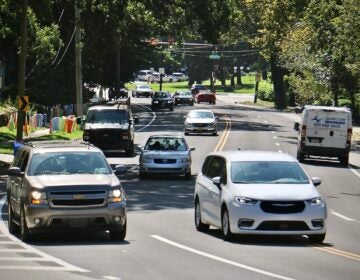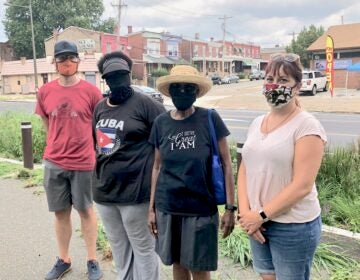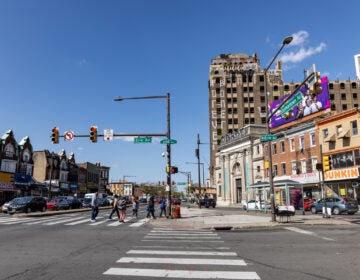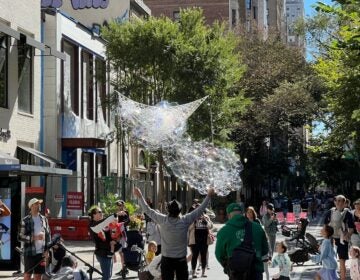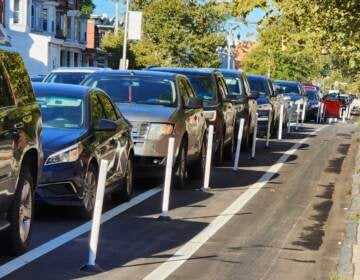Philly sees drop in deadly crashes due to road diet and other measures, new report says
Efforts have targeted the "High Injury Network," which includes the 12% of city streets with 80% of all traffic deaths and serious injuries in Philly.
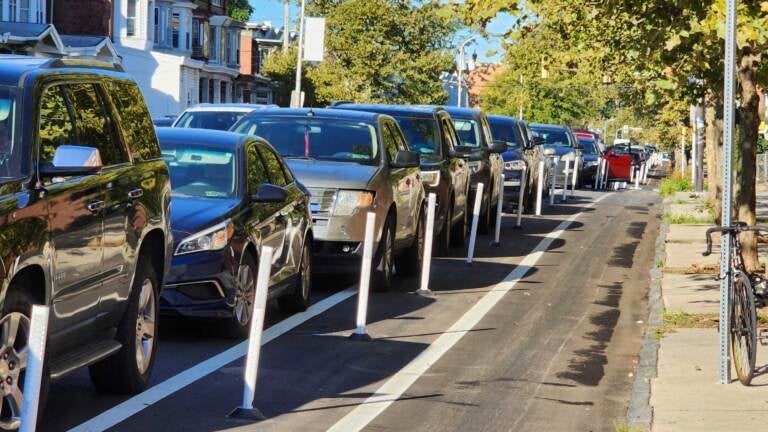
New bike lanes opened on Oct. 6, 2022 as part of the Chestnut Street Repaving and Safety Project. (Tom MacDonald/WHYY)
From Philly and the Pa. suburbs to South Jersey and Delaware, what would you like WHYY News to cover? Let us know!
An effort to slow drivers and reduce fatal crashes in Philadelphia is paying off, according to the city’s annual Vision Zero report released Tuesday.
Deputy Managing Director Mike Carroll said its annual review of accidents shows fewer in areas where traffic calming measures have been implemented.
“Fatal and serious injury crashes and total injury crashes have both decreased on Complete Streets projects,” Carrol said. “On Complete Streets projects, fatal injury crashes are down by 34%.”
Carroll said road diets are one of the three types of Complete Streets projects that have shown promise.
“We found that road diets reduce travel lanes and reallocate roadway space, but they also led to 18% and a 25% decrease in speeding, and we all know speeding is directly related to the severity of a crash,” he said.
A road diet includes adding turning lanes and cutting down on the number of lanes for drivers to use. It’s been used on Washington Avenue between 4th and Broad streets to trim lanes as part of recent repaving efforts.
Separated bike lanes and neighborhood slow zones are also cited as ways the city has worked to slow down drivers and prevent fatalities.
The city has focused on installing projects on the High Injury Network, which includes the 12% of city streets with 80% of all traffic deaths and serious injuries in Philadelphia.
“During COVID and after COVID people seem to go a little crazy,” said Mayor Jim Kenney. “Especially the way they drive around our streets at speeds that are ridiculous and maneuvers that are dangerous.”
“I think in the end people need to kind of examine their own behavior and figure out ways of slowing themselves down and not being as reckless as people can be,” Kenney said.
City Councilmember Jamie Gauthier said traffic has slowed on Cobbs Creek Parkway, where officials gathered Tuesday morning for the results announcement. She said the speed cushions, which are like speed bumps but wider, and other calming measures have been effective.
“This is just the tip of the iceberg because across West and Southwest Philadelphia, the city and state are undertaking numerous projects to keep residents safe as they move about our communities,” she said. “This includes repaving Walnut Street from here on the Cobbs Creek Parkway all the way down to 33rd Street.”
As part of the paving project, the existing painted bike lane will be upgraded to a parking separated bike lane, empowering more residents to safely move between West Philadelphia and Center City. Gauthier said West Walnut Street will also see freshly painted crosswalks, shorter pedestrian crossings, and fewer left turn vehicle lanes to reduce fatal and serious crashes.
Philadelphia’s high injury network includes Lincoln Drive, Kelly Drive, Broad Street, Passyunk Avenue, Market Street, Chestnut Street, Locust Street, and others. Within the 12 miles that make up that network, there is a large variety of road conditions. The goal of Vision Zero is to adapt road designs, slow down the drivers, and in turn, cut down on fatalities.
Streets Commissioner Carlton Williams said he’s also working with the newly hired public safety enforcement officers.
“These officers are enforcing non-moving violations that lead to unsafe streets. The officers are using tickets for blocking crosswalks, bike lanes, and sidewalks,” Williams said.
He said the initial group included more than a dozen officers. Soon, close to 125 officers will be patrolling the streets.
The department is also supporting the Philly Street Lighting Improvement project, a citywide project to replace 130 street lights with LEDs.
The LED network will support public safety and Vision Zero goals by increasing visibility when the roads are most dangerous.
Williams said the Streets Department is firmly committed to ensuring that every Philadelphia can get to work, school, home, or wherever they go safely.
Sarah Clark Stewart, of the Bicycle Coalition of Philadelphia, endorsed the effort.
“Making a concerted investment of people and capital dollars and taking on a really intractable issue,” she said, will “have an incredible impact on public health equity and the city’s economy.”

Subscribe to PlanPhilly
WHYY is your source for fact-based, in-depth journalism and information. As a nonprofit organization, we rely on financial support from readers like you. Please give today.




